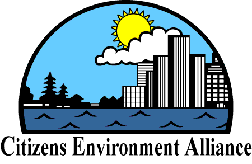| October 24, 2003 |
| FOR IMMEDIATE RELEASE |
CEA Joins Ontario Smart Growth Network: Urban Sprawl A Fundamental Threat To Healthy Ecosystems
Windsor, Ontario - The Citizens Environment Alliance (CEA) has joined other organizations in Ontario to form the Ontario Smart Growth Network. The network brings together organizations that are working to prevent urban sprawl and promote sustainable, compact and healthy communities across Ontario. The network is part of a broader North American smart growth movement involving national, provincial and state-wide organizations as well as local community organizations.
"We need a healthy environment, healthy communities and sustainable local economies. Implementing smart land use, transportation and community design throughout Ontario is a key element in attaining and sustaining healthy communities," stated Derek Coronado, Research and Policy Coordinator with the CEA. "If we continue to sprawl and develop into essential ecosystems our air and water quality will not improve," stated Coronado.
The Ontario Smart Growth Network will work to advance the principles of smart growth by stopping urban sprawl, fostering healthy communities, and supporting community involvement in planning. To help achieve the goal of smart growth, some priority actions have been identified, including:
- Integrate land-use planning with a comprehensive, Ontario-wide transportation plan that is environmentally and economically sustainable, and reflects smart growth principles.
- Restrict urban development to clearly defined urban boundaries.
- Ensure that water, sewage, energy and transportation infrastructure investments support development within existing urban areas, not new "greenfields" development.
- Support resident and community group involvement in the planning process (including the Ontario Municipal Board hearings) through intervenor funding and professional legal and planning assistance.
For more information contact:
Derek Coronado
Research and Policy Coordinator,
Citizens Environment Alliance
(519) 973-1116
Ontario Smart Growth Network
Guiding Principles
- We believe that urban development should take place in a way that protects nature, essential ecosystems, prime farmland and drinking water sources; makes efficient and sustainable use of energy, water and other natural resources; and minimizes pollution and waste.
- We believe that urban development should support healthy, distinctive and attractive communities, with affordable housing and easy access to employment, health care, education, and community services. Urban development should also create a strong sense of place where non-automobile based transportation modes, such as walking, bicycling and public transit, are the most appealing and viable transportation options.
- We believe that urban development should help sustain vibrant, diverse economies, with meaningful local employment.
Application of the Principles
We believe that there are three basic requirements with respect to achieving the principles of smart growth in Ontario: stopping urban sprawl, fostering healthy communities, and supporting community involvement in planning. For each of these requirements, we have identified priority actions that will help achieve the goal of smart growth.
- Stop urban sprawl
- Protect ecologically significant areas, prime agricultural lands, and drinking water sources.
- Place a moratorium on planning and building new 400-series highways and widenings or extensions to existing 400-series highways and municipal roads of equivalent size to allow time to integrate land-use planning with a comprehensive, Ontario-wide transportation plan that is environmentally and economically sustainable, and reflects smart growth principles.
- Restrict urban development to clearly defined urban boundaries.
- Ensure that water, sewage, energy and transportation infrastructure investments support development within existing urban areas, not new "greenfields" development.
- Reorient the priority of federal and provincial transportation infrastructure investments from highways to the provision of capital and operating support for public transit systems and transportation demand management.
- Provide incentives and tax policies to support urban intensification including brownfield redevelopment and the redevelopment of underutilized lands and buildings such as parking lots and vacant buildings, and remove incentives for urban sprawl.
- Foster healthy communities
- Ensure strong provincial and municipal policies and funding for smart planning and developing healthy communities.
- Design walkable, close-knit communities to meet the needs of people of all ages and abilities.
- Mix land uses in neighbourhoods (including homes, stores, offices, recreation facilities and services) to form diverse and attractive communities within which non-automobile-based forms of transportation (including walking, bicycling and public transit) are viable and appealing options for getting to work, shopping, childcare, recreation and other needs.
- Provide a range of housing to meet the needs of all household incomes.
- Ensure the viability and attractiveness of public transportation (including local and inter-urban transit, ride-sharing, and the integration of public transportation with ride-sharing, cycling and walking)
- Promote greenspace in communities, including natural parks, urban forests, recreational spaces and community agriculture.
- Support community involvement in planning
- Make development decisions predictable, fair, and cost-effective for communities.
- Encourage resident and stakeholder participation in community planning and decision-making.
- Support resident and stakeholder involvement in the planning process (including Ontario Municipal Board hearings) through intervenor funding and professional legal and planning assistance.
- Reform the Ontario municipal board process, to make it fairer and more accessible to community groups and individuals.

